Prophet Muhammad’s ﷺ Political Philosophy – Part II: Diplomacy, Rule of Law and Pluralism
Prophet Muhammad ﷺ: A Paradigm of Diplomat[1]
Prophet Muhammad ﷺ demonstrated extraordinary diplomatic leadership, underpinned by his deep commitment to justice, truthfulness, and peaceful engagement. His diplomacy was not merely strategic but driven by a moral foundation that set a precedent for future political leaders. One of the most notable instances of his diplomatic acumen was the Treaty of Hudaybiyyah in 628 CE. Despite appearing disadvantageous to Muslims at the time, the treaty allowed a ten-year truce between the Muslims and the Quraysh. This gave the Muslim community time to grow, build alliances, and spread Islam without the immediate threat of conflict. Prophet Muhammad’s foresight became evident when, two years later, the Quraysh violated the treaty, giving him the moral authority to take control of Mecca peacefully. This diplomatic success reshaped the political dynamics of the region, proving that restraint and patience could achieve lasting victories.
Another example of his diplomatic skill is his engagement with foreign rulers, including his letter to Heraclius, the Byzantine Emperor. The Prophet invited Heraclius to Islam while emphasizing peaceful relations and mutual respect. Even though the emperor did not accept the invitation, his favourable reception of the letter reflects the respect and recognition the Prophet commanded across diverse political and cultural spheres. These examples, along with many others, illustrate how Prophet Muhammad ﷺ set a high standard of diplomacy. His leadership was built on the principles of peace, justice, and the moral imperative to avoid unnecessary conflict, emphasizing harmony over warfare.[2]
Rule of Law and Impartial Justice Through Lens of Prophetic Leadership
The Rule of Law is a fundamental principle in both classical and modern political thought, emphasizing that no one, not even the ruler, is above the law. Prophet Muhammad’s (PBUH) adherence to the rule of law is evident in his uncompromising commitment to justice, as demonstrated in the case of theft during his leadership. When a prominent woman from a noble family was accused of theft, some members of the community sought to have her pardoned due to her status.
أَخْبَرَنَا مُحَمَّدُ بْنُ مَنْصُورٍ، قَالَ حَدَّثَنَا سُفْيَانُ، عَنْ أَيُّوبَ بْنِ مُوسَى، عَنِ الزُّهْرِيِّ، عَنْ عُرْوَةَ، عَنْ عَائِشَةَ، أَنَّ امْرَأَةً، سَرَقَتْ فَأُتِيَ بِهَا النَّبِيُّ صلى الله عليه وسلم فَقَالُوا مَنْ يَجْتَرِئُ عَلَى رَسُولِ اللَّهِ صلى الله عليه وسلم إِلاَّ أَنْ يَكُونَ أُسَامَةَ فَكَلَّمُوا أُسَامَةَ فَكَلَّمَهُ فَقَالَ النَّبِيُّ صلى الله عليه وسلم " يَا أُسَامَةُ إِنَّمَا هَلَكَتْ بَنُو إِسْرَائِيلَ حِينَ كَانُوا إِذَا أَصَابَ الشَّرِيفُ فِيهِمُ الْحَدَّ تَرَكُوهُ وَلَمْ يُقِيمُوا عَلَيْهِ وَإِذَا أَصَابَ الْوَضِيعُ أَقَامُوا عَلَيْهِ لَوْ كَانَتْ فَاطِمَةَ بِنْتَ مُحَمَّدٍ لَقَطَعْتُهَا " .
Which means "A woman stole (something) and she was brought to the Prophet. They said: "Who would dare to speak to the Messenger of Allah except Usamah." So, they spoke to Usamah and he spoke to (the Prophet). The Prophet said: "O Usamah, the Children of Israel were destroyed because whenever a noble person among them committed a crime, for which a Hadd punishment was deserved, they would let him go. But if a low-class person among them committed such a crime, they would carry out the punishment on him. If Fatimah bint Muhammad were to steal, I would cut off her hand."
Likewise, one more captivating incident came across to the glorious history of the Prophet Muhammad’s astute leadership that upheld the idea of Rule of Law. At the end of the Battle of Badr, fought on March 13, 624 CE (17th of Ramadan), is a landmark in Islamic history, symbolizing the triumph of faith over formidable odds. Situated near the town of Badr in modern-day Saudi Arabia, this battle was pivotal in the early days of Islam. Despite being outnumbered three-to-one, with 313 men and only two horses against an army of 1,000 Quraysh soldiers, the Muslim forces under Prophet Muhammad's ﷺ leadership emerged victorious. The victory was perceived as a divine intervention, boosting the morale of Muslims and affirming the justness of their cause. The Quraysh, led by Amr ibn Hishām, sought to crush the growing Islamic movement, but their defeat solidified the Prophet's position both politically and spiritually across the Arabian Peninsula.[3]
But! There was a huge issue regarding what should be done with the pagan captives of the Battle?
After the Battle of Badr, the treatment of captives posed a crucial issue for the Muslim community. Prophet Muhammad (peace and blessings be upon him) consulted his companions on how to handle the prisoners. Abu Bakr (may Allah be pleased with him) suggested releasing them in exchange for ransom, arguing that the funds would strengthen the Muslims and that some captives might later embrace Islam. On the other hand, ‘Umar ibn Al-Khattab and Sa’d ibn Mu’adh (may Allah be pleased with them) advocated for the execution of the captives, considering them influential disbelievers who could rally future opposition. The Prophet (peace and blessings be upon him) opted for Abu Bakr's suggestion, favouring ransom over execution. However, this decision led to a divine reprimand, as revealed in Surah Al-Anfal (8:67-69), where Allah warned against taking captives before securing a decisive victory over the enemy. This warning deeply affected the Prophet, as mentioned in Islamic history, where he and Abu Bakr were found weeping, reflecting on the repercussions of the decision. Despite this initial caution, Allah permitted the Muslims to take ransom from the captives. The ransom varied depending on the individual’s ability, and in cases where captives couldn't pay, they were tasked with teaching literacy to Muslim children. This compassionate approach showcased the balance of justice and mercy in Islamic leadership, emphasizing the importance of education and the humane treatment of prisoners, which became a lasting legacy of the Prophet's diplomacy and governance.[4]
In the aftermath of the Battle of Badr, Prophet Muhammad (peace and blessings be upon him) emphasized the just and merciful treatment of captives. When some Muslims requested to exempt Al- ‘Abbaas, the Prophet’s uncle, from ransom, the Prophet insisted that every prisoner, including Al-‘Abbaas, should pay the ransom without exceptions. This reflected his impartial application of justice (as reported by Al-Bukhari). In the description of this event, a Hadith says " لا تدعوا منه درهما واحدا" which means "Do not leave even a single dirham [from his ransom]".[5]
The Prophet also ordered Muslims to treat captives kindly, leading to exemplary behaviour from the Ansaar. For instance, Mus’ab ibn ‘Umayr’s brother narrated that while in captivity, the Ansaar gave their prisoners bread and ate only dates themselves. This generous treatment had a profound effect, causing many captives, such as As-Saa’ib ibn ‘Ubayd and Abu ‘Azeez, to later embrace Islam (At-Tabarani).
"كان أبو عزيز بن عمير بن هاشم أخو مصعب بن عمير في الأسارى، فقال أبو عزيز: وكنت في رَهْط من الأنصار حين أَقبَلوا بي من بدر، فكانوا إذا قدَّموا غذاءهم وعشاءهم، خصُّوني بالخبز وأكلوا التمرَ؛ لوصية رسول الله صلى الله عليه وسلم إياهم بنا، ما تقع في يد رجل منهم كسرةُ خبز إلا نفحني بها، فأستحي أن أردَّها على أحدهم، فيردها عليَّ ما يَمَسها، وكان الخبز لديهم أجود من التمر؛ لكثرة التمر عندهم، وقلة الطحين والخبز" [6]
" The hadith narrated by Abu Azeez ibn Umayr refers to the exceptional kindness and generosity displayed by the Ansar (residents of Madinah) towards their captives from the Quraysh after the Battle of Badr. Abu Azeez, the brother of Mus'ab ibn Umayr, mentions that although he was a captive, the Ansar gave him bread—considered more valuable due to its scarcity—while they themselves ate dates, which were more abundant. They did this in obedience to the Prophet Muhammad's ﷺ instruction to treat the captives well. This extraordinary kindness had a profound impact, as even the captives were surprised by the generosity. " [7]
These incidents underscore the Prophet’s (PBUH) belief in equality before the law, a principle central to modern democratic systems. His leadership not only upheld the rule of law but also ensured that justice was applied without favouritism or discrimination, aligning with the ideals of equality and fairness championed by modern political theorists.[8]
Pluralism in Prophet Muhammad’s Governance
One of the most remarkable aspects of Prophet Muhammad’s ﷺ political philosophy is his approach to Pluralism. His governance model in Medina included agreements with non-Muslims, such as the Ẓimmi agreements, which guaranteed protection and freedom of religion to non-Muslims living under Muslim rule. These agreements promoted peaceful coexistence and mutual respect among diverse communities, a principle that resonates with modern political theories advocating for pluralism and inclusivity. Prophet Muhammad ﷺ not only acknowledged the rights of non-Muslims but also incorporated their customs and traditions into the broader framework of governance, as long as they did not conflict with the fundamental principles of justice and morality. This approach reflects a pragmatic and inclusive political philosophy that transcends religious and ethnic boundaries, promoting social harmony and unity. The Prophet Muhammad ﷺ never sought power as an end in itself. His approach toward non-Muslims in Medina was characterized by peaceful outreach rather than hostility. He welcomed them with kindness and respect. As stated in a well-known narration:
“The best among you are those who have the best manner and character.”[9]
According to the Ẓimmi agreement, non-Muslims, if they chose not to embrace Islam, were to be protected from harm by the state. This agreement did not imply that non-Muslims were to be treated as second-class citizens. Instead, Prophet Muhammad ﷺ championed principles akin to secularism and pluralism, striving to maintain peace and harmony. An example of his commitment to this principle is found in a narration involving Abu Huraira. A Jewish merchant, who had been struck by an Ansari for referring to Moses (peace be upon him) with reverence, sought the Prophet’s intervention. The Prophet ﷺ responded with visible anger and admonished the Ansari for making distinctions between prophets. He clarified that on the Day of Judgment, he would be among the first to recover from the swooning, with Moses (peace be upon him) holding the Throne. The Prophet ﷺ also emphasized that no prophet should be deemed superior to another, including Yunus (peace be upon him).[10]
Conclusion
Prophet Muhammad’s ﷺ approach to governance was characterized by a commitment to justice, inclusivity, and the rule of law. His decision-making process, particularly in the aftermath of the Battle of Badr, illustrates a nuanced understanding of statecraft that transcends mere power dynamics. The Prophet’s preference for ransom over execution for captives, despite initial divine reprimand, highlights his dedication to mercy and humane treatment, which is in alignment with modern principles of justice and rehabilitation. Furthermore, the Prophet’s interactions with non-Muslims and the implementation of the Ẓimmi agreements underscore his commitment to pluralism. By ensuring the protection of non-Muslims and respecting their religious practices, Prophet Muhammad (PBUH) demonstrated an early model of governance that embraced diversity and promoted social harmony. His leadership in Medina was not about seeking power for its own sake but about fostering a community where justice, respect, and ethical conduct were paramount.
In integrating classical political theories, such as those proposed by Hobbes, Locke, and Rousseau, with his own governance model, Prophet Muhammad ﷺ provided a framework that addresses both the spiritual and material needs of society. His emphasis on equality before the law, as illustrated by his unwavering stance on punishment regardless of social status, aligns with contemporary democratic values. The Prophet’s leadership exemplifies how prophetic wisdom can complement and enhance classical and modern political thought, offering valuable insights for contemporary governance.
By bridging classical and modern political theories, Prophet Muhammad’s ﷺ legacy continues to inspire and inform discussions on effective and moral leadership in today’s complex political landscape. Prophet Muhammad did not intuitively gain the title of a far-sighted political leader; he earned it. This is why he is honored with the title Uswatun Hasana—the “excellent model”—worthy of a true 'political leader,' a role that has been, is, and will continue to be essential for society.
This is why, the Irish Philosopher, George Bernard Shaw couldn’t resist him saying “It is the only religion which appears to me to possess that assimilating capacity to the changing phase of existence which can make itself appeal to every age. I have studied him - the wonderful man and in my opinion far from being an anti-Christ, he must be called the Saviour of Humanity. I believe that if a man like him were to assume the dictatorship of the modern world, he would succeed in solving its problems in a way that would bring it the much-needed peace and happiness: I have prophesied about the faith of Muhammad that it would be acceptable to the Europe of tomorrow as it is beginning to be acceptable to the Europe of today.”[11]
References
[1] Siddiqi, M. H. (n.d.). Prophet Muhammad (PBUH) as a political leader. IslamOnline. https://islamonline.net/en/prophet-muhammad-pbuh-as-a-political-leader/
[2] Talib, Aziz. (1991, August). The Islamic political theory of Muhammad Baqir al-Sadr of Iraq. ICIT Digital Library. ResearchGate.https://www.researchgate.net/publication/315099311_The_Islamic_Political_Theory_of_Muhammad_Baqir_Al-Sadr_of_Iraq
[3] Watt, W. M. (1993). The Prophet Muhammad and the rise of Islam. Oxford University Press. p 150-200.
[4] The Battle of Badr and the Issue of the Captive – II. (2009, June 4). Islam.net (English). https://islamweb.net/en/article/152052/the-battle-of-badr-and-the-issue-of-the-captives-ii
[5] Ibn Hibban. (n.d.). Kitāb al-Sīrah al-Nabawiyyah wa Akhbār al-Khulafāʾ. Wikisource. Retrieved September 10, 2024, from https://ar.wikisource.org/wiki
[6] Ahmad, E. K. (2015, January 20). من أخلاق معركة بدر الكبرى: الكرم. مقالات متعلقة. https://www.alukah.net/sharia
[7] Ahmad, E. K. (2015, January 20). من أخلاق معركة بدر الكبرى: الكرم. مقالات متعلقة. https://www.alukah.net/sharia
[8] The Battle of Badr and the Issue of the Captive – II. (2009, June 4). Islam.net (English). https://islamweb.net/en/article/152052/the-battle-of-badr-and-the-issue-of-the-captives-ii
[9] (Sahih Al-Bukhari, 6029).
[10] (Sahih Muslim, 2373a)
[11] Goodreads. (2024). Sir George Bernard Shaw. George Bernard Shaw > Quotes > Quotable Quote. Retrieved September 10, 2024, from https://www.goodreads.com/quotes/7945339-i-have-always-held-the-religion-of-muhammad-in-high
Bibliography
Abdel Razek, A., Loutfi, M., & Filali-Ansary, A. (2013). Islam and the foundations of political power (Vol. 2, p. 144). eCommons@AKU. http://ecommons.aku.edu/uk_ismc_series_intranslation/1
Ahmad, E. K. (2015, January 20). من أخلاق معركة بدر الكبرى: الكرم. مقالات متعلقة. https://www.alukah.net/sharia
Berlin, I. (1958). Two concepts of liberty. Oxford University Press.
Bowering, G. (Ed.). (2015). Muhammad. In G. Bowering (Ed.), Islamic political thought: An introduction. Princeton University Press. https://doi.org/10.23943/princeton/9780691164823.003.0010
Farman, M., & Yucel, S. (2023). Rereading the Hudaybiyya treaty: With special reference to Ibn ʿUmar’s role in Fitan. Religions, 14(5), 666. https://doi.org/10.3390/rel14050666
Haris, M. (n.d.). Prophet Muhammad (PBUH) as a political thinker. ALJUMUAH. Retrieved September 10, 2024, from https://www.aljumuah.com/prophet-muhammad-as-a-political-thinker/
Hart, M. H. (1992). The 100: A ranking of the most influential persons in history (Rev. ed.). Citadel Press.
Hobbes, T. (1651). Leviathan (Chapters 13-15; Chapter 14; Chapter 16). Andrew Crooke.
Ibn Hibban. (n.d.). Kitāb al-Sīrah al-Nabawiyyah wa Akhbār al-Khulafāʾ. Wikisource. Retrieved September 10, 2024, from https://ar.wikisource.org/wiki
Locke, J. (1689). Two treatises of government (Book I, Chapters 3-9; Book II, Chapters 8-9; Book II, Chapter 9). Awnsham Churchill.
Machiavelli, N. (1532). The prince (pp. 15-29, 63-79, 93-107). Translated by W. K. Marriott. A. A. Knopf. (Original work published 1532).
Marx, K. (1867). Capital: Critique of political economy (Part I). Otto Meissner Verlag.
Mill, J. S. (1859). On liberty (Chapter 1; Chapters 2-3). John W. Parker and Son.
Rawls, J. (1971). A theory of justice (Chapters 1-3; Part III). Harvard University Press.
Rousseau, J.-J. (1762). The social contract (Book I, Chapter 1; Book I, Chapter 6; Book II, Chapter 1; Book IV). Marc-Michel Rey.
Siddiqi, M. H. (n.d.). Prophet Muhammad (PBUH) as a political leader. IslamOnline. https://islamonline.net/en/prophet-muhammad-pbuh-as-a-political-leader/
Talib, A. (1991, August). The Islamic political theory of Muhammad Baqir al-Sadr of Iraq. ICIT Digital Library. https://www.researchgate.net/publication/315099311_The_Islamic_Political_Theory_of_Muhammad_Baqir_Al-Sadr_of_Iraq
The Battle of Badr and the Issue of the Captive – II. (2009, June 4). Islam.net (English). https://islamweb.net/en/article/152052/the-battle-of-badr-and-the-issue-of-the-captives-ii
Watt, W. M. (1993). The Prophet Muhammad and the rise of Islam (pp. 100-200). Oxford University Press.
Disclaimer
The views expressed in this article are the author’s own and do not necessarily mirror Islamonweb’s editorial stance.

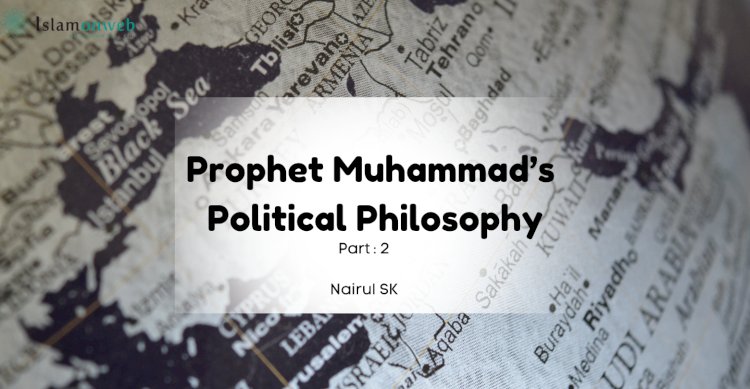


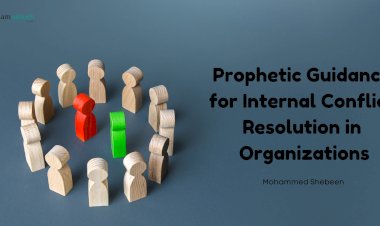


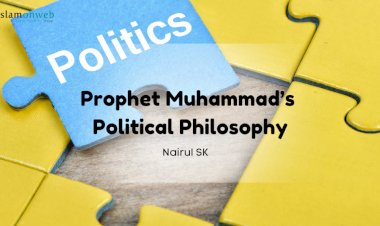
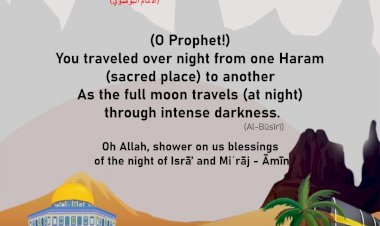
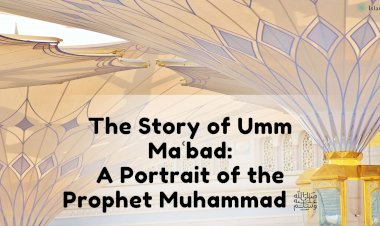














Leave A Comment